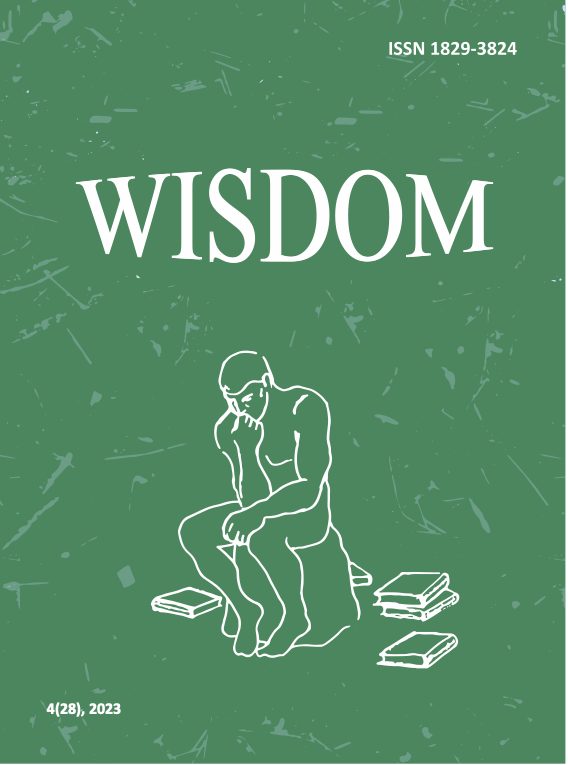David the Invincible: Philosophy as a Lifestyle
DOI:
https://doi.org/10.24234/wisdom.v7i2.149Keywords:
David the Invincible, Socrates and Plato, Paideia, care of the soul, spiritual practices, Foucault, HadotAbstract
The most outstanding representative of the history of Armenian philosophy, Neoplatonic thinker of the V-VI centuries, David the Invincible continues the tradition reached the peak of its development in the Ancient Greece by Socrates and Plato, according to which philosophy is first of all a way of life, a means of transformation and perfection of the human being. Following the principles of the Greek Paideia David considers philosophy as a care of the soul, in which theory and practice are intertwined, and cognition of the world depends on the efforts of self-improvement by a subject. Author shows that in David’s definitions of philosophy is clearly seen the significance of self-formation, “zardarum” in the process of reality formation, comprehension or rethinking. It is also mentioned that we can use Michel Foucault’s notion of the “care of the soul” and Pierre Hadot’s notion of “spiritual practices’’ to characterize David’s optimistic philosophy, which was developed further in the theories of Armenian thinkers Grigor Narekatsi, Grigor Magistros, Hovhannes Imastaser, Arakel Sjunetsi, etc.
Downloads
References
Barnes, J. (2009). David and the Greek Tradition. In V. Calzolari, & J. Barnes (Eds.). L’oeuvre de David L’Invincible et la transmission de la pensee grecque dans la tradition armenienne et syriaque, Commentaria in Aristotelem Armeniaca- Davidis Opera. Vol. 1. Boston: Brill, Leiden.
Busse, A. (Ed.). (1904). Commentaria in Aristotelem Graeca. Vol. 18, part 2. Berlin.
David Anhaght (the Invincible). (1980a). Erkasirut’iwnq p’ilisop’ayakanq, hamahavaq qnnakan bnagrery’ & ar’ajabany’ S.S. Arevshatyani (Philosophical Tractats, Critical Texts and Introduction by S.S. Arevshatyan, in Armenian). Yerevan.
David Anhaght (the Invincible). (1980b). Erker, t’argmanut’yuny’, ar’ajabany’ ev c’anot’agrut’yunnery’ S.S. Arevshatyani (Works, Translation, Introdaction and Notes by S.S. Arevshatyan, in Armenian). Yerevan.
Dvoretskii, I. X. (1958). Drevnegrechesko-russkii slovar’ (An Old Greek-Russian Dictionary, in Russian). Vol. 1. Moscow.
Foucault, M. (1986). The Use of Pleasure, (R. Harley, Trans.) New York: Pantheon.
Foucault, M. (2007). Germenevtika sub’’ekta (The Hermeneutics of the Subject, in Russian). The Course of Lectures taught in the College de France in 1981-1982 (Trans. from French). SPb.
Hadot, P. (1995). Philosophy as a Way of Life. In A.I. Davidson (Ed.), Spiritual Exercises from Socrates to Foucault (M. Chase, Trans.). Oxford, Cambridge.
Liddel, H.G., & Scott, R. (1968). A Greek-English Lexicon. Oxford: Clarendon Press.
Muradyan, A. (1981). Davit’ Anhaght’i andznavorut’yan, jhamanaki u gitakan jhar’angut’yan harci shurj, (Concerning the Person, the Time and the Scientific Heritage of David the Invincible, in Armenian), Patmabanasirakan handes. No 1.
Petrosyan, S.S. (2000). Davit’ Anhaght’: P’ilisop’ayut’yuny’ vorpes hogu xnamq (David the Invincible: Philosophy as the Care of the Soul, in Armenian). Newsletter of the Yerevan State University. No 1. Yerevan.
Sanjian, A.K. (1986). David Anhaght (the Invincible): An Introduction. In A.K. Sanjian (Ed.), David Anhaght the “Invincible” philosopher. Atlanta, Georgia: Scholars Press.
Sorabji, R. (1990). The Ancient Commentators on Aristotle. In Sorabji R. (Ed.), Aristotle Transformed, The Ancient Commentators and their influence. Ithaca, New York: Cornell University Press.
Downloads
Published
How to Cite
Issue
Section
License
Creative Commons Attribution-Non-Commercial (CC BY-NC). CC BY-NC allows users to copy and distribute the article, provided this is not done for commercial purposes. The users may adapt – remix, transform, and build upon the material giving appropriate credit, and providing a link to the license. The full details of the license are available at https://creativecommons.org/licenses/by-nc/4.0/.















